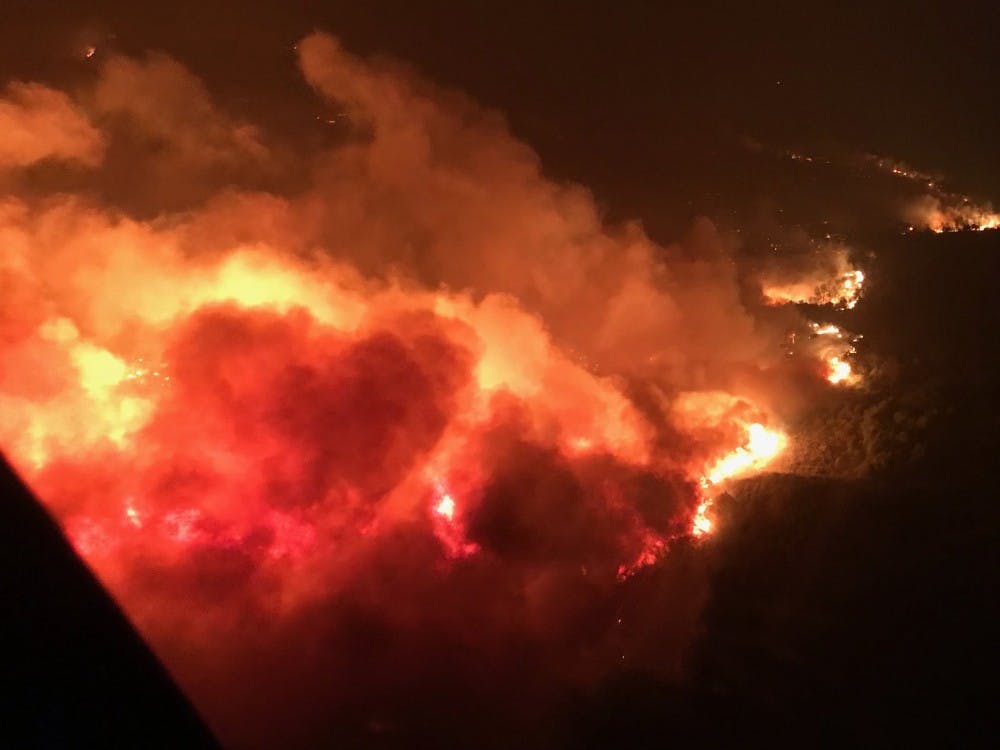Strong winds have spread the Tubbs Fire, causing it to become California’s most destructive wildfire in history.
Two-hundred-fourty thousand acres of land, 8,400 structures and 42 people have been lost in the wildfires, according to Cal Fire — a government sponsered website providing wildfire information — as of Oct. 21.
Almost 3,000 miles from Northern California, Elon University has felt no effect from the fire, but some Elon students have.
According to the Office of the Registrar’s 2017 Fall Report, there are 147 students at Elon with permanent addresses in California — this makes up 2.2 percent of Elon’s total enrollment this fall.
“The fires have not yet directly affected my hometown, but it has definitely affected the air quality,” said senior Max Herrera, resident of San Mateo, California. “There has been so much ash in the air, it is like a haze in the sky, and you can taste it, you can taste the ash.”
Skies filled with ash, however, is not the only way that these fires have been affecting Elon students.
According to the California Statewide Fire Summary, as of Oct. 21, 100,000 people have been forced out of their homes, a problem freshman Rose Lehrman and her family have been trying to do their part to fix as residents of Marin
County, California.
“We are opening our house up to anyone who needs support or a place to stay if their house is in jeopardy,” Lehrman said. “We want to make sure they have a place to go if they are affected and know that they are supported and that they have a place to be safe.”
While none of Elon’s students have directly been hit by the Tubbs Fire, many have vivid wildfire memories from when they lived in California.
“It is scary to think about [the Tubbs Fire] because I have flashbacks of the sky turning completely black and days when you couldn’t even see the sun,” said senior Matt Kimball, resident of San Diego, referring to a wildfire experience he had in 2003. “You couldn’t see 25 feet past you, ash was falling like rain — it looked like a hellscape. There is nothing I can use to describe it that will relate it to things we see at Elon.”
Lehrman has only ever encountered controlled fires in the mountains near Marin County, but even controlled fires left
her terrified.
“Driving through the mountains that are blazing is a little scary, I can’t even imagine what the people are going through right now,” Lehrman said. “Just seeing the flames take them over and turn the gold hills to black is crazy.”
These students hope to never encounter a fire like the ones in California, but according to Assistant Chief Charles Walker of the Elon Fire Department, there is a possibility that North Carolina may suffer a similarly structurally destructive fire.
“We have a lot more people moving into rural areas now than before. You have more construction and more houses being built in rural areas,” Walker said. “With more people comes the opportunities with more chances of fires, and with more people, there are more structures that could be damaged.”
But even with the possibility of a destructive fire, Elon continues to focus on taking care of those students currently being affected by the Tubbs Fire.
On Oct. 11, the Office of Student Life reached out in an email to Elon students with permanent addresses in California.
In the email, Jana Lynn Patterson, associate vice president for student life and dean of students, offered words of comfort, counseling support and resources created to help establish communication with those affected by the wildfires.
“The University community is thinking of all of you and are holding you in our hearts and prayers,” Patterson wrote. “I hope that you have heard from your loved ones that
everyone is safe.”


